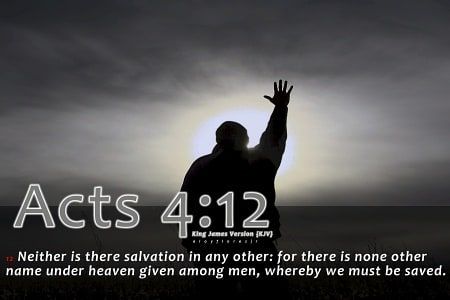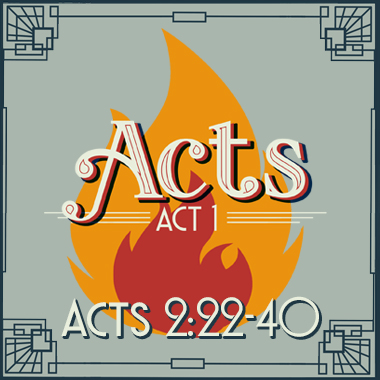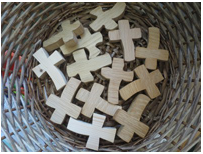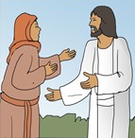|
Peter preached to the high priest after he was arrested with John. “Rulers and elders of the people! 9 If we are being called to account today for an act of kindness shown to a man who was lame and are being asked how he was healed, 10 then know this, you and all the people of Israel: It is by the name of Jesus Christ of Nazareth, whom you crucified but whom God raised from the dead, that this man stands before you healed. 11 Jesus is “‘the stone you builders rejected, which has become the cornerstone.’ 12 Salvation is found in no one else, for there is no other name under heaven given to mankind by which we must be saved.” (Acts 4:8-12) Peter preached to the council during his testimony. “Which is right in God’s eyes: to listen to you, or to him? You be the judges! 20 As for us, we cannot help speaking about what we have seen and heard.” (Acts 4:19-20)
0 Comments
Peter preached a short sermon in Solomon's porch. “Fellow Israelites, why does this surprise you? Why do you stare at us as if by our own power or godliness we had made this man walk? 13 The God of Abraham, Isaac and Jacob, the God of our fathers, has glorified his servant Jesus. You handed him over to be killed, and you disowned him before Pilate, though he had decided to let him go. 14 You disowned the Holy and Righteous One and asked that a murderer be released to you. 15 You killed the author of life, but God raised him from the dead. We are witnesses of this. 16 By faith in the name of Jesus, this man whom you see and know was made strong. It is Jesus’ name and the faith that comes through him that has completely healed him, as you can all see.
17 “Now, fellow Israelites, I know that you acted in ignorance, as did your leaders. 18 But this is how God fulfilled what he had foretold through all the prophets, saying that his Messiah would suffer. 19 Repent, then, and turn to God, so that your sins may be wiped out, that times of refreshing may come from the Lord, 20 and that he may send the Messiah, who has been appointed for you—even Jesus. 21 Heaven must receive him until the time comes for God to restore everything, as he promised long ago through his holy prophets. 22 For Moses said, ‘The Lord your God will raise up for you a prophet like me from among your own people; you must listen to everything he tells you. 23 Anyone who does not listen to him will be completely cut off from their people.’ 24 “Indeed, beginning with Samuel, all the prophets who have spoken have foretold these days. 25 And you are heirs of the prophets and of the covenant God made with your fathers. He said to Abraham, ‘Through your offspring all peoples on earth will be blessed.’ 26 When God raised up his servant, he sent him first to you to bless you by turning each of you from your wicked ways.” (Acts 3:12-26 NIV) There are ten great sermons preached in the Acts of the Apostles: five by Peter, one by Stephen and four by Paul. On the day of Pentecost, Peter converted the Jews by testifying Christ had died and risen again.“Fellow Jews and all of you who live in Jerusalem, let me explain this to you; listen carefully to what I say. 15 These people are not drunk, as you suppose. It’s only nine in the morning! 16 No, this is what was spoken by the prophet Joel:
17 “‘In the last days, God says, I will pour out my Spirit on all people. Your sons and daughters will prophesy, your young men will see visions, your old men will dream dreams. 18 Even on my servants, both men and women, I will pour out my Spirit in those days, and they will prophesy. 19 I will show wonders in the heavens above and signs on the earth below, blood and fire and billows of smoke. 20 The sun will be turned to darkness and the moon to blood before the coming of the great and glorious day of the Lord. 21 And everyone who calls on the name of the Lord will be saved.’ 22 “Fellow Israelites, listen to this: Jesus of Nazareth was a man accredited by God to you by miracles, wonders and signs, which God did among you through him, as you yourselves know. 23 This man was handed over to you by God’s deliberate plan and foreknowledge; and you, with the help of wicked men, put him to death by nailing him to the cross. 24 But God raised him from the dead, freeing him from the agony of death, because it was impossible for death to keep its hold on him. 25 David said about him: “‘I saw the Lord always before me. Because he is at my right hand, I will not be shaken. 26 Therefore my heart is glad and my tongue rejoices; my body also will rest in hope, 27 because you will not abandon me to the realm of the dead, you will not let your holy one see decay. 28 You have made known to me the paths of life; you will fill me with joy in your presence.’ 29 “Fellow Israelites, I can tell you confidently that the patriarch David died and was buried, and his tomb is here to this day. 30 But he was a prophet and knew that God had promised him on oath that he would place one of his descendants on his throne. 31 Seeing what was to come, he spoke of the resurrection of the Messiah, that he was not abandoned to the realm of the dead, nor did his body see decay. 32 God has raised this Jesus to life, and we are all witnesses of it. 33 Exalted to the right hand of God, he has received from the Father the promised Holy Spirit and has poured out what you now see and hear. 34 For David did not ascend to heaven, and yet he said, “‘The Lord said to my Lord: “Sit at my right hand 35 until I make your enemies a footstool for your feet.”’ 36 “Therefore let all Israel be assured of this: God has made this Jesus, whom you crucified, both Lord and Messiah.” (Acts 2:22-40 NIV) “Lessons from Geese” was transcribed from a speech given by Angeles Arrien at the 1991 Organisational Development Network and is based on the work of Milton Olson. As each goose flap its wings it creates an“uplift” for the birds that follow. By flying in a “V” formation, the whole flock adds 71% greater range than if each bird flew alone.
People who share a common sense of direction and community can get where they are going quicker and easier because they are travelling on the thrust of one another. When a goose falls out of formation, it suddenly feels the drag and resistance of flying alone. It quickly moves back into formation to take advantage of the lifting power of the bird immediately in front of it. If we have as much sense as a goose we stay in formation with those headed where we want to go. We are willing to accept their help and give our help to others. When the lead goose tires, it rotates back into the formation and another goose flies to the point position. It pays to take turns doing the hard tasks and sharing leadership, as with geese, people are interdependent on each other’s skill, capabilities and unique arrangement of gifts, talents or resources. The geese flying in formation honk to encourage those up front to keep up their speed. We need to make sure our honking is encouraging. In groups where there is encouragement, the productivity is much greater. The power of encouragement (to stand by one’s heart or core values and encourage the heart and core of others) is the quality of honking we seek. When a goose gets sick, wounded or shot down, two geese drop out of formation and follow it down to help and protect it. They stay until it dies or can fly again. Then they launch out with another formation or catch up with the flock. If we have as much sense as geese, we will stand by each other in difficult times as well as when we are strong. This article by Betty Hollinrake was found in the December 1985 issue of Progress, the monthly magazine of the Romford United Reformed Church N.B. this article was written during the lead up to Christmas. It is an appropriate coincidence that the letter for this issue [December 1985] is J which is for Jesus who took an earthly body at His birth, which we celebrate at this time of year. As far as we know, He did not suffer from any ailments, but He did not abuse His body either. He needed His body so that we could see God's spirit working in our world. Our own bodies provide our spirits with the means to carry on God's work, so we have a responsibility to try to understand it and keep it in good working order.
J is also for joints that provide our body with the ability to move about. They are formed where two bones meet, and the majority are enclosed in a balloon like structure called a capsule. The ends of the bones are covered with a smooth, tough substance called cartilage that is kept lubricated, so that the joint moves easily. The weight baring joints (e.g. hips and knees) take quite a heavy load and need regular rests (when we sit or lie down) to relieve the pressure on the joint surface and allow them to recover. You can understand from this that if we remain standing for long periods without a break, or are overweight then the pressure on the cartilage is excessive and there is a tendency for the cartilage to begin to wear away. This is the beginning of arthritis. So - treat your joints gently. This article by Peter Patterson was found in the December 1985 issue of Progress, the monthly magazine of the Romford United Reformed Church "Glory to God in the highest..." sang the angels heralding the very first Christmas. "Glory, glory, hallelujah!" we sing as we reach the chorus of the Battle Hymn of the Republic. "See you in Glory," we say as we part from Christian friends we might not see this side of Heaven. But what do we mean by this word GLORY? In the Old Testament the Hebrew word carried the idea of worthiness. When used of men it spoke of their wealth or splendour. However, the glory of Israel was not in her riches but in her God - Yahweh. His glory was revealed in the cloud which led His people and settled on Mount Sinai (Ex. 16:19 and 24:15). In the New Testament the Greek word in its secular sense means reputation. However, it is used mainly to describe the revelation of God in Jesus Christ. Reflected in Jesus "He reflects the brightness of God's glory," says the writer to the Hebrews in chapter one and verse three. The glory of God was to be revealed in many of the events surrounding the earthly ministry of Jesus.
In John's Gospel the hour of Christ's death is called His hour of glory showing that it was no accident but the supreme revelation of God's love and justice at the cross. The challenge for us is that the glory of God in the face of Jesus Christ should still be seen and reflected in the church (2 Cor 4:3f). The resurrection and ascension are manifestations of the glory of God in Christ but above all it will be revealed in its fullness at the end of time when Christ comes again to take all believers to be with Him. See you in Glory!
“The largely Jewish-Christian audience for whom Matthew writes would appreciate the sharp debate between Jesus and the Canaanite woman – it was part of their religious culture. The woman is commended because the depth of her need is greater than any possibility of taking offence. She is acutely aware that as a non-Jew she may not deserve anything at all, but she isn’t going to give up. The story is told to strengthen our faith. Don’t take offence, don’t give up if you think you are being ignored, don’t give up when others try to put you off, and don’t take no for an answer. She knows Jesus’ reputation and knows that he could heal her daughter if only he would.”
During this current crisis we have all had to adapt, for me coming out of lockdown has proved harder than I thought it would be, one positive thing that has happened is that standing in queues has led to many diverse conversations and in a lot of cases my own beliefs have come into the conversation, I imagine that most of those that I have spoken to had some idea of their own faith or lack of it, but NO Body put me down, whether they understood well that’s another matter. “What looks somewhat racist (calling the Canaanites ‘dogs’) is turned around. In a society in which women didn’t speak to men, a woman is heard. This foreign woman, who had the temerity to speak to Jesus, has been offered salvation. The gospel is for people of all nations. Women matter. She has been fed, and indeed can share in the heavenly banquet – a point recalled in many English-speaking Eucharistic traditions: ‘We are not worthy so much as to gather up the crumbs under thy table.’ She is one of us and we are one with her.” How are we conformed by the church? How and why do we draw lines about who’s in and who’s out? People are easily scandalised about how other people worship and/or behave. Do we take offence? In many centuries, including our own, there has been a great deal of drawing of lines around who’s acceptable among Christian communities and who is not. Might we see this Gospel story as one that demonstrates that the Messiah has come not just for his own people – and certainly not just for ‘people like us’ – but for the whole world? Interestingly I would ask you to ponder this, back in July at Blue Sky Mondays, we were visited by a Hindu lady, she had come to pray we welcomed her and listened intently to her stories, she then introduced us to three other Hindu ladies, excitingly telling them that they could come on Monday evening for some prayer time, initially it was slightly confusing but then I understood, I listened and new that God welcomes all – even if it was only so they could have some time in prayer or just wanted to talk. I did listen and I did understand. We go out today, renewed and strengthened in faith We go out today, renewed and strengthened in faith, ready to serve you, Lord, and find you in the people we meet. We go out to follow you, and our hearts. Lead us, good Lord. Amen. © ROOTS for Churches Ltd www.rootsontheweb.com Reproduced with permission. The lectionary readings for today are as follows: Isaiah 56. 1, 6-8, Psalm 67, Romans 11. 1-2a, 29-32, and finally the reading I will be looking at today. Mathew 15. (10-20), 21-28
Mathew 15. (10-20), 21-28 “At first glance the two sections of this passage seem unconnected. But read together, the second story (from v.21) takes on a different hue. It all starts with the Pharisees criticising Jesus’ followers over their hygiene (v.2), to which Jesus replies that what makes people unclean does not come from what they put into their mouths, but from what is in their hearts. His disciples tell him that he has upset the Pharisees with this answer, and he tells them that he does not care – because they are blind guides. When Peter asks Jesus to explain the parable, its unclear what he is referring to – is it verse 11 or 14? Jesus explains his saying about food, and goes on to say that people demonstrate they are unclean by what they say and how they treat other people.” This tells me that quite often we listen, we hear but we don’t understand, one of the many reasons for carrying out Bible Study is to attempt to dig deep and by doing so understand, when moved from the Vine Ilford in the mid-sixties I was a very young Junior Church assistant, I had I thought covered all bases – I had listened to all those that taught me about the Bible, but how wrong I was our head of Junior Church at the time showed me other ways of reflecting on our Bible stories it was a major thing for me it I think set me on the correct path, over the following years there have been many who guided me on the path of understanding. “The story of Jesus’ encounter with the woman shares the thematic link of food and belonging. Indeed, the whole of chapter 15 can be seen as a collection of stories that have to do with the basis of inclusion in God’s people. So, a Canaanite – and we might recall that there are two such women, Rahab and Tamar, in Jesus’ family tree (Matthew 1.3-4) – seeks healing for her daughter. Jesus is silent. But the woman must have persisted because his disciples implore Jesus to send her away because of her incessant shouting. Jesus tells her he has come only for those born in the house of Israel – perhaps one of the disciples had suggested that if Jesus did what she wanted, she’d leave them alone. But she persists, kneeling before him, imploring him to help. Jesus reiterates his previous answer, injecting it with typical Jewish anti-Gentile invective – ‘dogs’ – suggesting that what is meant for Israel should not be given to outsiders. Generally, use of the term ‘dogs’ in the Old Testament is a derogatory one, a metaphor for people who are beyond the pale. It sounds like a final rejection of the woman’s request. Yet, it could be seen as a proverbial saying that offers an invitation to respond. And this the woman does, giving as good as she gets, concluding the proverbial statement by suggesting that the children, of course, are fed first – but the house dogs then get their share.” Do we sometimes disapprove of someone because of the way they look or sound, do we pigeonhole people by their appearance even by their accent, and are we as fair minded as we should be, especially in the times we are living through. How do we feel about the person refusing for instance to wear a face mask, to not maintain social distancing. We have to always attempt to understand but as with the disciples sometimes it’s very hard. “Jesus is amazed. Peter, listening to this, was told a short time ago that he was a man of little faith; now he hears Jesus saying that this woman has great faith. The contrast is obvious, and not just with Peter but also with the leaders of the house of Israel (15.1-9). Although Jesus has primarily come as Israel’s Messiah, his ultimate goal is to reach the nations with his saving grace.” Come, with purpose, into the presence of the living God. Come to worship, and to be amazed, to discover and learn new things. Come, knowing that God welcomes us all with open arms. Amen. As per my last blog for Sunday 26th July we are called to worship but for now in a very different way!
they will remain on the Heath & Havering Website so can be re-looked at any time going forward. I thought that the title of this week’s Blog was very relevant I don’t know how many of you have dipped into any of these Blogs if you have I truly hope that you have got something from them, even if that’s a prayer that you liked, a picture that you felt was relevant, a group of words that meant something to you. We that is Nelmes United Reformed Church have decided to complete two Zoom services in August, lots of other churches are doing the same or similar, including our own Western Road Church, we have been opening Nelmes on a Monday night (7-8pm) for individual prayer, as a warden on duty every other week I have been surprised and delighted at the conversations I have had on those evenings, from people actively wanting to have some quite time to those who just want to talk & those that ask what is going on, once explained those that I have spoken with appreciate the thinking behind the idea. They have listened and hopefully understood.
Sometimes we & I include myself in that number assume we listen and understand as a general rule of thumb, but do we listen properly if we don’t then how can we understand. “Don’t be afraid to listen, don’t be afraid of what you might hear, as it says in Psalm 50: “ Our God is coming, but not in silence; a raging fire is in front of him, a furious storm is around him.” We must be always alert so we can listen and understand!” This article by C. Hawkes was found in the January 1953 issue of Progress, the monthly magazine of the Romford Congregational Church We have heard in our first talk [see previous article] how, often unwittingly, the way was prepared for the coming of Christ into this world, and I would like to continue from there.
During the days of His childhood His path, like ours, was smoothed by loving parents, but the time soon came when, to fulfil the plan and to do the work for which God has sent Him, He had to take the hard way. He left the smooth path and took the unmade road which led Him to Calvary, and although He Himself took that way, it was ordinary people like you and me, who were responsible for the conditions of His path through life. The friends, His disciples, who worshipped their Master, did everything in their power to make His road happy and comfortable. So many small incidents in the Gospels show of their concern for Him, when He was tired or when they thought the people were worrying Him. Yes, they tried to show their love in a practical form, as did those who opened their homes to him, where He gladly partook of the hospitality offered. Then there were the people who prepared Christ's way into Jerusalem by spreading in His path palm branches and even their own garments. What joy these little acts of devotion must have brought to our Saviour's heart. But, alas, those who were concerned about Him were few compared with those who, to put it into modern, idiom, "Couldn't have cared less" what sort of path He trod. Then, worst of all, there were those who hated Him and deliberately prepared that awful road to Calvary. Since those days Christianity has spread all over the world, and yet how little His way has changed. There are still the friends, still the indifferent, and still the hostile, and I think each one of us here should search our hearts and ask ourselves the question: "What am I doing to Prepare the Way of the Lord and make His path straight?" My first job on leaving school was in the drawing office of a big engineering works in Manchester. It was in the days when Crystal Sets were the wonder of the age, and the 2LO station was still in its infancy. There was great excitement everywhere when the news got round that the first provincial broadcasting station was to be in our grounds, and that Royalty was coming for the opening day and would also inspect our works. Perhaps some of you know Trafford Park, Manchester, but for you who do not I will tell you that it consists of miles and miles of factories, bordering the famous Ship Canal, and the road that ran right through the Park (why they called it that I can't imagine, because anything more unlike a park does not exist) was cobbled and in a very bad condition through the continuous heavy traffic, but immediately it was known Royalty was coming, gangs of road repairers appeared and that long road right to the gates of the works, and through them for a further half mile up to the doors of the New Station, was made straight for the coming of a man who was one day to be an earthly king. That was not forced labour. It was done joyfully and all the energy that they possessed was put into it, and yet we give so little thought to the coming of Christ and the way He has to tread. I wonder into which category, on thinking about it, we have had to put ourselves. Have you had to admit that you are one of the hostile, again crucifying Christ? One of the saddest things about Christ's death was that it was Judas, who had one time loved Him and lived in daily contact with Him, who first put Him on the direct road to the Cross. There are still many Judas's in this world, who are still willing to sell the Lord they once loved, and all He stands for - for thirty pieces of silver. But perhaps you are just one of the very large crowd who are indifferent. The majority of people nowadays wouldn't harm Him, but they don't even notice Him. If you ask them they call themselves Christians, yet they never give Christ a thought. There is no way prepared for Christ to enter their hearts, and because He is not there they cannot prepare the way in the hearts of others. For instance, it is impossible for those who do not know Christ to make His way plain in the hearts of their children. I was horrified to read, the other day, that in an Australian school a class was asked the question, "Does God really exist?" and ninety-six per cent answered "No." I hope this would not be the reply if put to a class in England but the Australians are a people of our race, a Christian - not a heathen land. How sadly the parents and teachers of those particular children have failed in the preparation for Christ's coming. Perhaps in answer to the question we have asked ourselves, we, here, can all truthfully say "I do love the Lord, and I am trying to prepare His way." But how hard are we working? Trade Union hours and no more? Or are we like those workmen in Manchester, prepared to work long hours, joyfully, so that the work shall be done to time? Do we go to church on Sunday and then go home feeling that we have done all that is required of us, and pleased that we are not among those dreadful people who never think of going to church? Or perhaps we teach in Sunday School and then say, "Ah, well, I've done my bit until next Sunday." How easy it is to slip into the self-righteous state. At our church meeting recently we had a discussion on the methods a Christian should use to win people for Christ, and many seemed to think that living a good life before men was sufficient, but I felt that this was not enough. There are so many people who never give a thought to God whose lives compare very favourably with the lives of many Christians. There are thousands of these people who spend there lives in service for others, and so a Christian living a life of love and service is just classed with the others as a "good sort". How then are we to Prepare the Way? By our everyday lives, certainly, but we must endeavour to teach as well as live our religion. Can I give you an illustration of what I mean? Perhaps you have read it already in your daily paper. Some months ago, in North London, quads were born, one of whom died soon after birth, but the other three thrived. It soon became apparent, however, that they were all blind, and the parents were persuaded that the kindest thing to do was to let them go to a home for blind children where they would be cared for, and they knew that if they agreed it would mean that their children would one day be able to make a living for themselves, but can you imagine having to make that decision, and the desolation in the home afterwards? How fortunate for them that their doctor was a Christian. Up till now she had shown to that family all the kindness and service that a Christian should, but she went further. She brought them a Bible and asked them to read it every night, and then pray for their babies' sight, even though the specialists had said that it was hopeless. She also taught a little prayer to the seven-year-old boy. The sequel - a few weeks ago one baby was noticed reaching out for a spoon. An examination was made it was found that the baby could see. It was restored to its parents, and the doctor came round and led the prayers of gratitude to God. She could have been a sincere Christian and yet left behind in that home nothing more than the reputation of being a kind doctor, but she not only lived her Christianity, she taught it, and in that home joy and hope were born, and the Way was prepared for the coming of Christ. Such grand opportunities do not often present themselves, but if they did, would we avail ourselves of them? It takes courage and endurance, this road-making, but shall we each pray for these qualities so that when He comes our bit of road shall be well done and His Way straight? |











 RSS Feed
RSS Feed